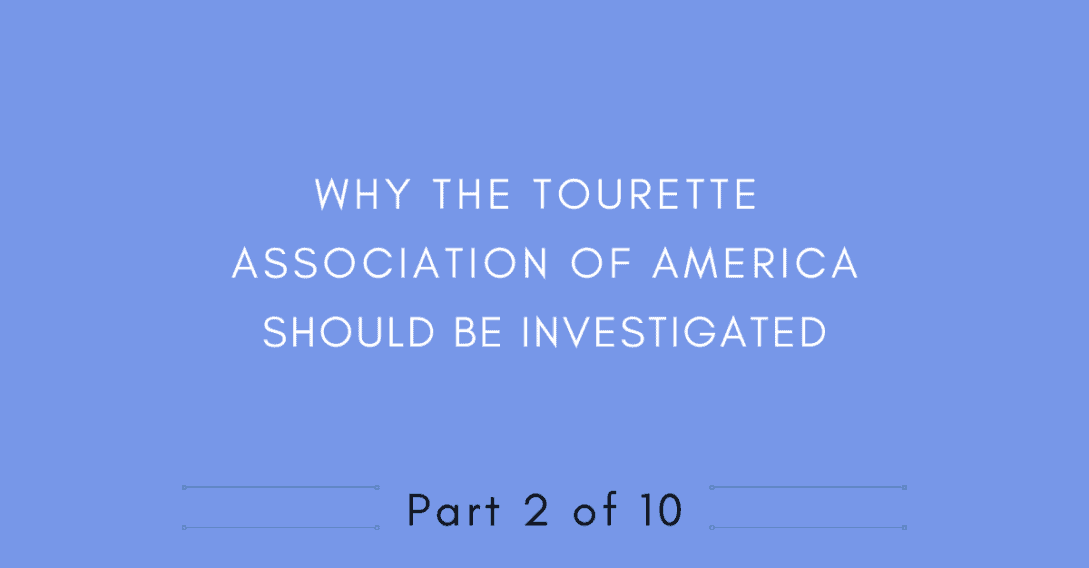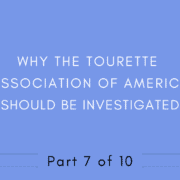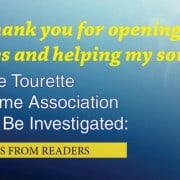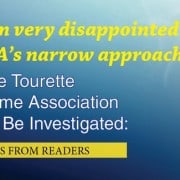Why the Tourette Association of America Should Be Investigated: Part 2
Looking back: Lack of progress treating Tourette syndrome for 40+ years

Sheila Rogers DeMare, Director Association for Comprehensive NeuroTherapy
Sheila Rogers DeMare, Director ACN
After Part 1 in this series was posted on our website, we heard from a number of people who wondered why we are taking aim at the national Tourette Syndrome Association/Tourette Association of America (TSA/TAA) when the organization does good work.
The reason we’re doing this? Because no matter how much hand-holding, support, and education takes place, until Tourette syndrome symptoms can be safely and effectively treated, suffering continues.
No stone should be left unturned in the search for the answers to this disorder, wherever that search may lead. To date, major clues in this search have been ignored by the TSA/TAA, and their literature about alternatives to drugs suggests they give more attention to warning people about trying nondrug options than they do to to exploring them. We have copies of what the TSA/TAA has said in this connection in past newsletters and on their current website as evidence of this, and that’s only part of the story. 
See our first article in this series here. To date, our organization’s main focus for Tourette syndrome has been on concepts such as diet, nutrition, the gut-brain connection, the immune system and allergy, underlying infections, and the role of environmental toxins. These are not far out, woo-woo topics. They are areas that receive considerable attention for many other medical conditions. At the same time, ACN has always welcomed reports on anything that helps.
Just as there can be many causes for headaches, there can be many causes for tics. We use the term Comprehensive in our group’s name because a number of approaches may be helpful to a given person.
It is no secret that conventional drug therapy for Tourette’s is far from satisfactory in both effectiveness and safety. If there were miracle drugs that stopped tics and related symptoms, while also being safe for children and adults, we would be the first to stand and applaud. But since there are not, and when potential avenues for better approaches are ignored, blocked, and kept from the public, an investigation is warranted.
Here’s an excerpt from a 1984 flyer by TSA, “Commentary on Alternative Therapies for Tourette Syndrome.” It is no longer available.
“The TSA since its inception has received letters from patients, families, doctors and other researchers regarding the successful control of Tourette syndrome symptoms through the use of treatments other than the medications referred to [haloperidol, clonidine, tranquilizers, antidepressants, antiepileptics and hypertensives].”
Well, the “inception” of TSA was 1972. Close to 50 years ago, people were alerting the national organization to the successful use of integrative therapies, without drugs. Yet medications with frightening side-effects are still routinely prescribed to children with Tourette syndrome and few other avenues have been explored. Further, invasive use of electrodes implanted in the brain are considered for so-called intractable cases.
The flyer was written by Ruth Bruun, MD, who was chairman of the TSA medical committee at the time. It is even-handed, addressing difficulties in assessing natural therapies, admitting problems with the standard medications, and sharing the types of successful non-drug approaches reported. Some direct quotes from families and doctors are included in the document.
Unfortunately, this straight-forward approach to the issue did not continue as future decades came and went. To our knowledge. Some excerpts are shared in the next article in this series.
A child with who was six years old when the TSA began is now 55 (2019). No matter how the TSA may try to appear more open-minded, they will not be able to erase the failure to act over all this time.
And let me point out that is it not sufficient to have comments about alternative approaches buried in the TSA’s literature, or in newsletter archives that most physicians and families will never see. What matters is the main message that is received by busy practitioners, desperate parents, the media and the public. To repeat from our opening article, the conventional message is: “Tourette syndrome is a baffling genetic disorder for which there is no cure.”
Our upcoming articles will expose the TSA’s bias against natural and integrative therapies.
- We’ll outline how the TSA medical and scientific advisory boards have blatantly dismissed opportunities to move the treatment of TS forward;
- You’ll read how a determined mother started a grassroots Alternative Therapy Network for Tourette syndrome and why she handed the baton to me in disgust;
- We’ll fill you in on a 1991 survey by the TSA that sought feedback on natural treatments and how the results were shelved;
- I’ll share what it was like for me to serve as liaison to the TSA on alternative therapies. In a word: shocking. (Make that two words: shocking and frustrating);
- We’ll explain how the TSA blocked the inclusion of our efforts in television documentaries on Tourettes;
- And you’ll hear why some doctors wonder how the TSA board members “can sleep at night.”
| Read the Other Parts of this Series: | ||||
| Part 1 | Part 2 | Part 3 | Part 4 | Part 5 |
| Part 6 | Part 7 | Part 8 | Part 9 | Part 10 |










Thank you for being an advocate for those of us who know there has to be another way than giving our kids so many harmful drugs to treat their tics!
Thank you, RMW. Let’s hope people start listening.
Our organization is not against conventional medications in general. But for Tourettes, the strong drugs often prescribed–which were really designed with other medical conditions and have been adopted for use in TS–should be a last resort because as you say, they can be harmful.
It’s not always easy to pursue “another way,” and professional help is often needed as some cases can be quite complex. At least families should be fully informed of choices.
“Just as there can be many causes for headaches, there can be many causes for tics.” So true! I know that for my own family, I don’t want to leave any stones unturned and will not be content with hearing that it’s OK when symptoms wax and wane.
Wax and wane. . . it’s a very strange concept to expect people with TS or their families to stand by and watch tics come and go (sometimes they change in severity and sometimes in type — or both) and be told that “this is just what they do.”
That’s the usual advice, sad but true. Hopefully things will turn around with voices from people like you. Thanks, Mary.
For me the alternatives have always been the most successful. They either help or not and you try something else without all the side effects of the drugs. Thanks for your work.
Appreciate the feedback, DER. I’m glad you’ve found approaches that help you. And good point–try one thing and then another to get the right fit, without the side effects.
An investigation will never happen.
The best approach is to start a competing organization and attempt to have the donors to TSA starting donating to the new group.
That’s a good suggestion, Dr. Shaw. I’ll finish laying out the situation, and then we can focus on that. Thank you!
Good idea!
Your list of upcoming articles on the topic looks good! Certainly a lot of things to bring out of the darkness and into the light. Trying to get TSA donors to donate here would be an amazing thing! Would love to see that happen. Let us know how we can help. We’ve got your back and believe in your efforts.
I’m with ML!
Thank you for the offer to help, ML. We have some major needs, like help with fundraising and grant writing. But we also need a lot of help with social media. We just started our Facebook, Twitter etc and would love it if people could help us promote those. It’s not my forte (don’t know enough!) and I also don’t have time.
We are open to suggestions from everyone on how to move this effort forward.
I love you saying you’ve “got my back.” Made my day, ML.
My thoughts…(deep sigh). The phenomenon you are describing, Sheila, is being played out over and over in multitudinous fields, in so many “expert” associations and agencies that people rely on. My first advice to readers—don’t automatically assume any expert group is truly expert, or more pointedly, that any expert group is operating without conflicts of interest. Sooooo many are, over time, cozied in with related industries who rely on certain “truths” to the exclusion of others. Those “truths” invariably keep the stream of money flowing for them, at the expense of the very people and causes they are supposed to serve. It’s a hard reality. But it’s so. It is so very so.
TSA may do some good, but it sounds like they are doing a lot of ungood along the way by closing themselves to other possibilities (which invariably leads to besmirching other “outside”researchers). Same thing with the American Cancer Society (and unfortunately, many of our federal agencies). Prevention and environmental approaches just aren’t lucrative like drugs and expensive therapies are. Why research prevention or solving the problems naturally when you and the pharmaceuticals, etc., can keep a good thing going. Pink ribbons, whoopdidoo, but don’t look at environmental causes that might lead to a dent in some industry’s bottom line. It’s cynical, but it happens. All too often, it happens. Something quirky in the human wiring. Good people slowly transform into the “three monkeys” who will not see anything, will not hear anything, and will not say anything that disturbs the company line, or bites the hand that feeds. Their truthiness bounces around in a hall of mirrors. They get their approval by staying a well-behaved part of that group. How do they sleep at night? Apparently very well.
Marne, I shared your comment in an article last week. Funny you mentioned the three monkeys — I often think of that when the TSA tries to control our message. Loved your comment about truthiness. Ha. Thanks for your thoughtful reply.
It is my understanding that cause of tourettes is genetic. The cure is to find the missing genes and replace them in the genome with the correct gene. This has been done with mice and is now being done experimentally with humans. Very soon this will be a common practice.